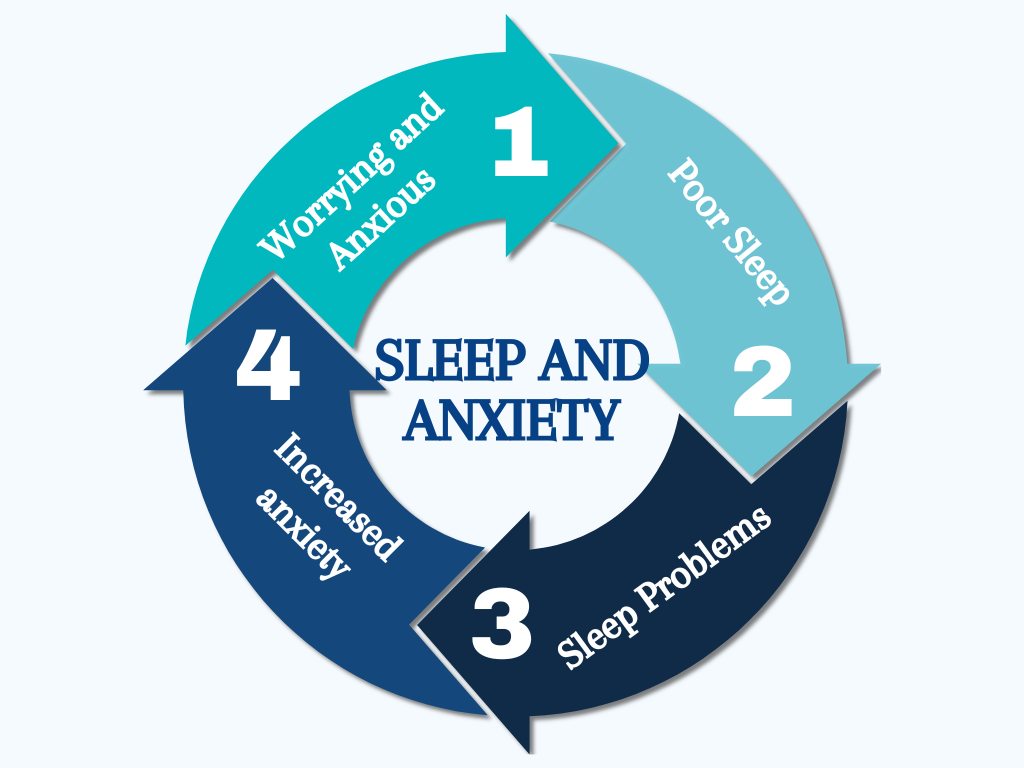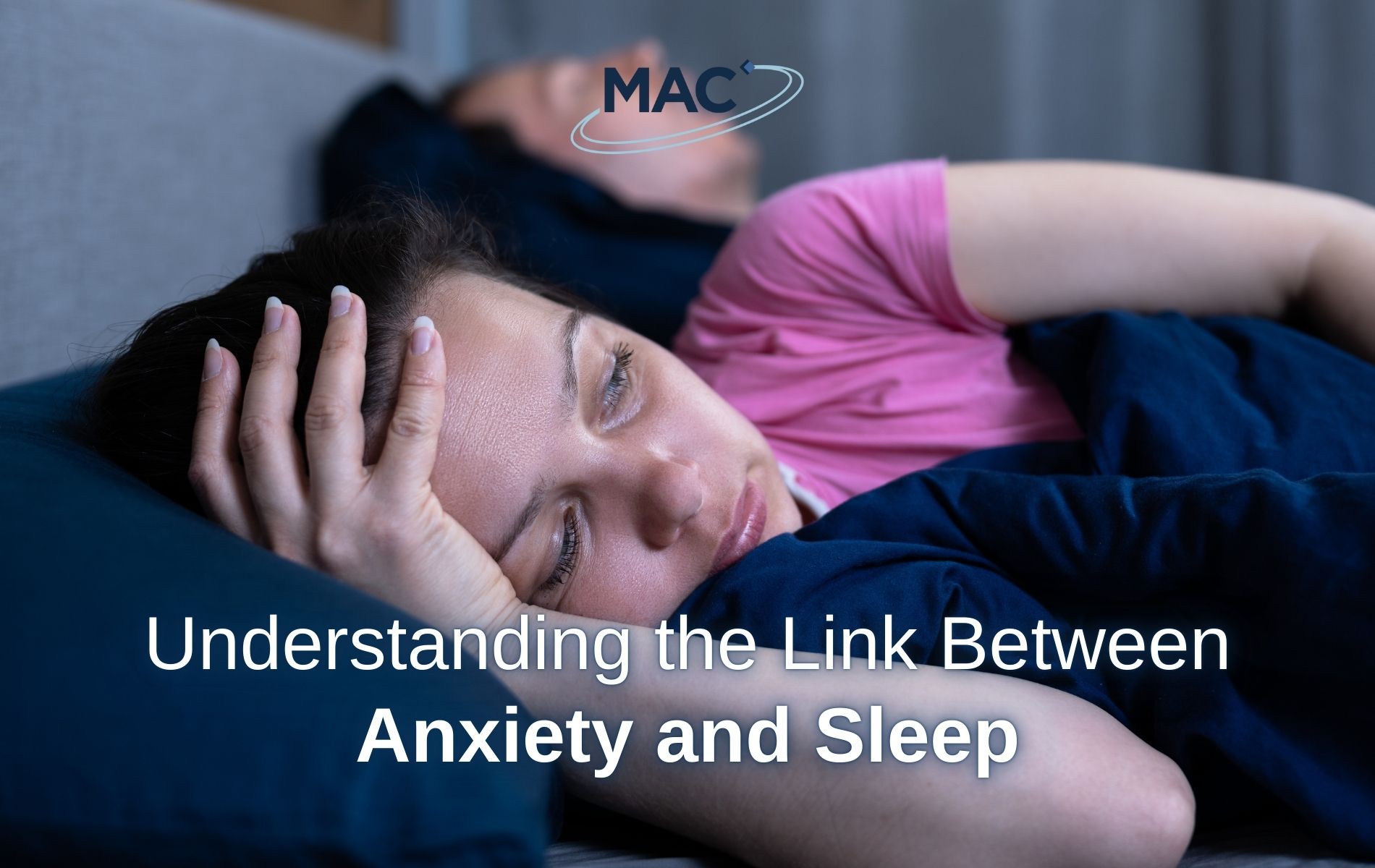Sleep plays a vital role in shaping physical and mental health and there is a strong connection between anxiety and sleep problems. People with mental health conditions tend to be more vulnerable to sleep issues such as insomnia or poor sleep quality. In this blog, we explore the links between anxiety and sleep and offer some tips that can promote good sleep hygiene while experiencing anxiety.
What is anxiety?
Anxiety is a term used to describe a range of mild to severe feelings of disquiet, such as worry or fear. It is perfectly normal for people to have feelings of anxiousness at some point in their lives, especially when facing a significant event, such as exams, job interviews, or having a medical examination1.
Anxiety serves as a natural response to fear, pressure, threat, or unfamiliar situations. It’s quite common to feel anxious during moments like this. However, some people find it difficult to manage their anxieties. Their worry is more persistent and frequently disrupts their day-to-day activities.
Symptoms of anxiety can include:
- Excessive worry
- Restlessness
- Having trouble concentrating
- Sleep disturbance
- Dizziness2
Anxiety is a core element of several mental health conditions, although not all are categorised strictly as anxiety conditions. This includes generalised anxiety disorder (GAD), social anxiety disorder, obsessive-compulsive disorder (OCD), post-traumatic stress disorder (PTSD), specific phobias and panic disorder4.
How can anxiety affect sleep?
Sleep disturbances are common in people with anxiety conditions, especially GAD, and are characterised by having one or all of the following:
- Having trouble going to sleep
- Having trouble remaining asleep
- Having restless sleep
Up to 75% of patients with GAD have insomnia. Insomnia has also been associated with a higher risk of anxiety disorders, with those who experience it over six times more likely to develop an anxiety disorder than those who do not3.
How does anxiety affect sleep exactly? Firstly, when you experience anxiety, your adrenaline levels are constantly operating at a higher-than-normal level. The body may find it hard to wind down, as this feeling stimulates a ‘fight or flight’ response. The intrusive thoughts produced by your anxiety can also further occupy the brain, making it harder to relax and therefore causing insomnia.
Individuals with various anxiety conditions, such as PTSD, OCD, and GAD, often experience difficulties falling asleep and report poorer sleep quality than those without anxiety. Research indicates that anxiety can lead to vivid dreams and nightmares during REM sleep, which could introduce fear of sleep, worsens insomnia, and may result in bedtime procrastination. This creates a vicious cycle: anxiety leads to disrupted sleep, and inadequate sleep further exacerbates anxiety4.

5 Tips for improving sleep hygiene when you have anxiety
It can be very challenging to maintain good sleep while experiencing anxiety. Below are some tips that might be helpful to build a good sleep routine when you have anxiety
1. Create a bedtime routine
Maintain a schedule and try to go to bed and wake up at the same time every day, even on weekends. Keep your bedroom cool, dark, and quiet, without distractions like a TV or computer. Avoid using an electronic device to read in bed.
2. Exercise regularly
Go for an afternoon walk on a regular basis; however, any vigorous exercise should be completed at least three hours before bedtime.
3. Avoid caffeine
This means avoiding or cutting down the consumption of products that contain caffeine, particularly at least 4 hours before bedtime; this could be tea, coffee, chocolate, and many soft drinks.
4. Be mindful of your diet
Avoid alcohol, large meals, or drinking a lot of fluid for several hours before bedtime.
5. Do something relaxing until you feel sleepy
If you don’t fall asleep within 20 minutes of turning in (or if you wake up and can’t fall back to sleep in 20 minutes), get out of bed and do something relaxing until you feel sleepy5. For example, you might read a book or practise deep breathing, once you start to feel sleepy, return to bed.
Experiencing anxiety and seeking new treatment options?
If you are living with anxiety, you could help researchers investigate potential new treatments. With your participation, you may be able to contribute to scientific research which may lead to new treatments for anxiety disorders
If you are eligible and choose to take part in one of our clinical trials, you will receive payment for your time and commitment, additionally, reasonable travel expenses will be paid, or transport provided.
Get involved by signing up today via our Anxiety study webpage.
References
- NHS – GAD
- NHS – Anxiety – Every Mind Matters
- Brenes, A.G. et al. 2009 – Insomnia in Older Adults with Generalized Anxiety Disorder
- Sleep foundation – Anxiety and sleep
- Harvard Health Publishing – Tips for beating anxiety to get a better night’s sleep




